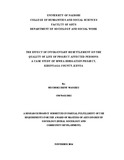| dc.description.abstract | Kenya’s Vision 2030 (Republic of Kenya, 2007) recognizes Mwea Irrigation Development
Project as one of the major flagship projects under water and sanitation. Such projects
necessitates involuntary resettlement of project affected persons. In order to present an
accurate assessment of the effects of any development project, it is not only important that
the impact of a development project is seen to be positive, project affected persons also
ought to perceive this to be the case. This calls for a consideration of theories that relate
project affected persons as stakeholders, their quality of life as the major dimension of
analysis. The broad objective of the study was to establish the effect of involuntary
resettlement on the quality of life of persons affected by the irrigation development project.
The study was conducted within the catchment area and downstream of Mwea Irrigation
Development Project in Kirinyaga County. Data was collected from Kabare area and lower
parts of Mwea in Kirinyaga South Sub-County where people were displaced by the project.
Descriptive survey design was employed. The target population was 709 families displaced
by the development project in Kabare and Mwea villages in Gichugu Constituency. This
comprised 255 households who opted for land-for-land and 454 households who opted for
cash-for-land compensation. The sample size was 146 project affected households.
Stratified random sampling based on the choice of compensation was applied. Data was
collected through administration of questionnaires to the project affected persons and Key
Informant Interviews were held with area chiefs, project officials and representatives of the
project affected persons. The data was analysed using descriptive statistical techniques such
as mean and percentages. Data was analysed using SPSS version 20.
The findings showed that the resettlement process led to the improvement in quality of life
of 79% of the respondents. The resettlement project positively impacted housing quality,
income and environmental quality without significantly interfering with peaceful
coexistence in the community, social relations or disrupting culture and tradition. The
irrigation project was of importance to the project affected persons.
Future involuntary resettlement programs should adopt a bimodal approach to
compensation whereby both cash and land are awarded as compensation. Cash
compensation should especially be provided in phases to help reduce cases of people
wasting away the compensation money and becoming squatters on the site of the project.
In case of partial compensation, the compensation policy should ensure that where the
remaining parcel of land is uneconomical to the project affected person, the land should be
fully acquired by the project and the owners fully compensated. Grievance committees
should also be set to hear appeals made by family members and interested parties involved
in resettlement disputes. | en_US |

